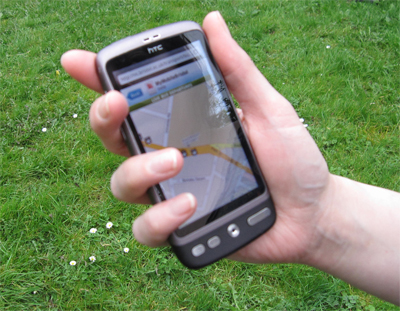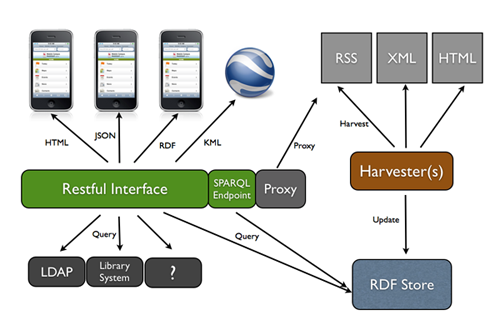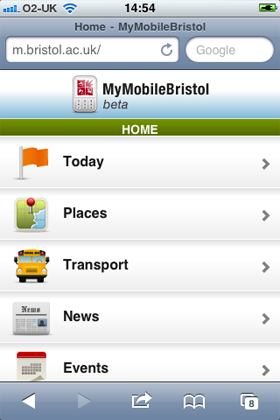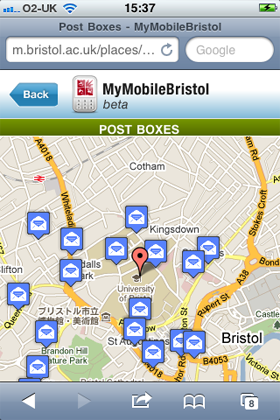MyMobileBristol
[toc hidden:1] The MyMobileBristol Project is managed and developed by the Web Futures group at the Institute for Learning and Research Technology (ILRT), University of Bristol [1]. The project has a number of broad and ambitious aims and objectives, including collaboration with Bristol City Council on the development or adoption of standards with regard to the exchange of time- and location-sensitive data within the Bristol region, with particular emphasis on transport, the environment and sustainability. The project also pilots a mobile Web application within the University of Bristol that provides access to data within an 'on-the-move' context via a smartphone [2]. The pilot benefits the University by providing a beta service that provides an opportunity for stakeholder analysis with staff and students, thus helping inform the development of our mobile strategy. This article describes the background to the inception of the project, the process and output of stakeholder engagement, outlines the software developed and highlights some of the opportunities and challenges we have faced in creating a platform that delivers content for mobile devices.
How the System Works
The software being developed by the MyMobileBristol Project provides a server-side solution for delivering mobile-friendly Web applications. The intention is not to create a mobile version of an existing Web site, but to provide information, automatically integrated together from diverse data sources, that is useful for members of the University on their smart phones that is, where appropriate, filtered by the date, time or current location. For example, you might see a map of University buildings in relation to your location, or view a list of events that are happening on the campus today. The Web applications are viewed by the Web browser on a mobile phone or desktop and it is not necessary to download a bespoke native application.

Figure 1: m.bristol.ac.uk viewed 'on the move'
Mobile Campus Assistant
MyMobileBristol builds upon the foundations of the Mobile Campus Assistant Project that was funded by the Joint Information Systems Committee (JISC) in 2009 [3]. The University of Bristol delivers a traditional Web site, portal and other Web applications geared towards desktop browsers. With the proliferation of mobile phones and the increasing number of smart phones on the market, the Mobile Campus Assistant Project provided an opportunity to look at the issues around the provision of time- and location-sensitive information to students.
The requirements of the original project did not need access to the camera, filesystem and other security-restricted parts of the hardware or operating systems on the phone. We did need to access the location of the user and this was supported by a number of phones in their Web browser via JavaScript [4]. This meant we could develop a single Mobile Web solution rather than developing several native applications to support the various smartphone platforms [5]. Moreover, ILRT has a strong background in developing software that uses Semantic Web technologies such as the Resource Description Framework (RDF) and SPARQL query language. RDF provides a powerful and flexible medium for modelling data and better supports the integration of heterogenous sources. SPARQL provides a language to query RDF that has some similarities in syntax to the Structured Query Language (SQL) that is used in traditional relational databases. The project provided an opportunity to test the appropriateness of these tools in delivering content to mobile devices. It was important that we did not burden University content providers with the overhead of a new content management system but would use, as far as it was possible, existing content and data sources. In effect, we needed a system that could aggregate content and Semantic Web technologies seemed a good fit for such a problem proposition.
To produce a 'just-in-time' and 'on-the-move' experience, we wanted to support a number of use cases. For example, we anticipated that smartphone users would want fingertip answers to questions such as what events are happening on campus today? Where is the nearest University wireless hotspot? When is the next bus to the halls of residence? The project achieved rapid success and was featured in JISC's toolshed publication [6].
The project brought a number of tangible benefits to the University. First, it allowed for some initial stakeholder analysis to help develop case studies that need to be supported by a mobile solution. Second, it identified gaps, inconsistencies and issues with data that we wanted to be delivered in a mobile context. For example, we can currently only show the number of free PCs that are available in two of the many labs situated within the campus. It was also clear that data need to be available in consistent and standard formats because, in some areas, it is currently necessary to scrape Web pages to obtain data. It was also evident that transport data in Bristol was difficult to obtain, but would be particularly useful for mobile users.
Business and Community Engagement
One of the key aims of the current MyMobileBristol Project is to formalise a collaboration between the University of Bristol, Bristol City Council [7] and other interested parties, both locally and nationally. The opportunity for collaboration was made possible through funding by the JISC [8] under their Business and Community Engagement (BCE) programme [9]. MyMobileBristol forms part of a portfolio of BCE 'Open Innovation' and 'Access to Resource' projects that are designed to allow Higher Education institutions to take a leading role in generating innovation through the development of ideas in open online marketplaces. With this remit, the project hopes to facilitate developers, data providers, policy makers and user groups to promote the development and deployment of innovative technologies. Towards this goal, we co-organised with the DevCSI Project [10] a one-day workshop on 'Developing for the Mobile Web' which was well attended by developers from across United Kingdom Higher Education institutions and a number of local Bristol developers [11]. The workshop proved to be a useful forum for institutions to share use cases, challenges and the solutions that were being delivered. We intend to organise a second workshop that focuses on the issues surrounding data, including ownership, licences and intellectual property. A final transferability workshop at the end of the project will focus on disseminating the outputs of the project for those interested both inside and outside the Higher Education sector.
Collaborative Platform
Initial deliverables produced by the project were a collaborative platform to underpin the relationship with stakeholders, steering group members and other interested parties. A number of tools constitute the platform, including a wiki [12], issue tracker [13], mailing lists [14] and blog [15]. The blog provides a place for project dissemination, while the wiki provides a forum to document the software, record meetings, and note stakeholder analysis and ideas. The issue tracking software allows us to keep track of tasks related to the project and bugs relating to the software. We provide two mailing lists. The first is a public mailing list which includes all members of the steering committee and other interested parties. A second list is restricted to stakeholders and interested parties within the University of Bristol.
There is an aspiration to develop and discuss the project openly, but there are some matters that relate to University business that are more comfortably dealt with on an internal list. Pages on the wiki and tickets in the issue tracker are open to the public, but some pages are restricted to members of the University or just the development team. There is a tension between what can be handled in the public or private spheres and it is all too easy to default to the latter rather than thinking whether or not information should be available within the public domain.
Stakeholder Engagement
Stakeholder engagement is a key aspect of the project and is carried out through a number of different activities. JISC Techdis provided useful guidance and critical advice to the project in the preparation of a stakeholder engagement plan. The project itself is overseen by a steering group made up of staff from the Public Relations Office, Research Enterprise and Development, Estates and IT Services from within the University; as well as representatives of the transport department at Bristol City Council. The steering group provides guidance for the project team and guides the direction of development and the refinement of use cases, especially in relation to the deployment of a beta service.
Members of the project team have also had meetings with stakeholders and data source owners. There has also been an opportunity to discuss the project with local small businesses which are involved in the production of mobile solutions. The stakeholder engagement has been a valuable exercise in developing uses cases, stakeholder analysis and opportunities for dissemination. Through talking to various user groups, other possible opportunities have arisen, such as providing a mobile Web site to support the next University Open Day and providing a virtual tour of the campus. It was also clear that stakeholders wanted the mobile experience to be embedded into the wider context of the city with access to information on services, amenities and cultural events. To provide access to this information, developing the relationship with Bristol City Council was important.
Bristol City Council
Bristol City Council has adopted the ambitious 20:20 Plan, where the aim is to be one of the top twenty cities in Europe within the next 10 years [16]. This is based on a number of priorities such as the promotion of Bristol as a culturally vibrant and innovative city that is moving towards a low-carbon economy. In fact, Bristol intends to reduce, by 2020, its carbon footprint by 40% compared to 2005 statistics. Part of this strategy involves becoming a 'Smart City' whereby innovation can drive smarter solutions in power consumption and transport. The provision of better and real-time data is important, coupled with building a community of interested parties in developing 'smart' applications that consume these data and help Bristol's citizens to make 'smart' choices in areas such as transport [17].
Both central and local governments are releasing public data to help improve the transparency on how administrations work and policies are developed. There are now 5,400 datasets available on the data.gov.uk Web site [18]. Bristol City Council had already released some data under the B-Open scheme, including the location of libraries and bus stops, data relating to air and river quality and listings of events in the city. The Media Sandbox, a development programme sponsored by Bristol City Council, South West Screen and The South West Regional Development Agency, has commissioned a number of projects to develop innovative applications that use the council data [19]. For example, Hills are Evil provides a map overlay that helps those with restricted mobility, cyclists, and people with push-chairs to identify appropriate routes through the city [20].
The Council is now auditing its transport data to investigate what might be made publicly available. One issue the Council faces is the fact that most geo-location data are plotted using Ordinance Survey (OS) software, which means the data are then encumbered with an OS licence. The Council are required to use a definitive source of geo-data, as opposed to open sources such as OpenStreetMap, in order to support legal decision making and dispute resolution in a robust manner. Despite these issues, the Council is keen to collaborate with the University and provide data that will be useful to the project. For example, we have received a dataset that provides the location of B-Open wireless hotspots across the city. In addition, we will provide a useful case study on how the data should be delivered and in what format. The data from the Council will help embed the University mobile experience within the wider context of the city.
The Software
The following section gives a brief technical overview of the Mobile Campus Assistant software that has continued to be developed for the MyMobileBristolProject.
Where it is possible, harvesters retrieve remote data sources and convert them to RDF. The software currently has harvesters for RSS, Atom, XML and HTML. The data are then queried with SPARQL query language and displayed in an HTML format suitable for mobile Web browsers via a RESTful interface. Where it is not possible to harvest data the software can query supported services such as Lightweight Directory Access Protocol (LDAP). A lot of development effort has been spent making the software production-ready and organising the code so that it is modular. The project is Java-based and uses a number of Java frameworks and libraries:
- Jersey - an implementation of the Java API for RESTful Web Services [21]
- FreeMarker template engine [22]
- Jena Semantic Web Framework [23]
- H2 Database Engine [24]

Figure 2: Software architecture
The software, available under a BSD style open source licence, provides a lightweight solution that can be extended to support other data sources and services [25].
m.bristol.ac.uk
It has already been noted that we are running a beta service within the University (also called MyMobileBristol) that uses the software that we have developed. This provides an opportunity to develop the code to production-grade and allows for further stakeholder analysis with staff and students. We are also planning further engagement with students through a usability expert, using short interviews to gauge their expectations of content in a mobile application and to evaluate what is provided within the demonstrator.

Figure 3: The home page of m.bristol.ac.uk
We have continued to extend the functionality of the Mobile Campus Assistant software and are continuing to add further data sources. One useful addition is the crowd-sourced geo-location data from OpenStreetMap. It allows the provision of data relating to the local environment, such as the location of public bicycle stands, nearest post box, cash point or other local amenity.

Figure 4: Postboxes around the campus
The service has not yet been widely advertised across the University due to its beta status, but despite this we have seen a reasonable amount of traffic and members of the campus are providing suggestions via a feedback form [26]. At the moment, we are only delivering open data but there are requests for more personalised data such as timetables. Next stages of development include providing authentication through the Single Sign-On system and providing a search against the Library catalogue system.
Conclusion
The MyMobileBristol Project started with a comprehensive set of aims and objectives. We continue to engage successfully with stakeholders and interested parties to develop use cases. We are running a beta service within the University and collecting evidence to support a mobile strategy. The data and content produced by the University and third parties, which are then used by a mobile device, do provide a number of problems for an institutional strategy. For example, the data might be aggregated, integrated and reused in a manner that was not initially anticipated. The data themselves might be incomplete, of poor quality or might not be provided in 'real time' and thus prove unsuitable for mobile users 'on the move'. Other data might need to be limited to authenticated users.
Stakeholder engagement has shown the desire to embed the mobile experience within the wider context of the city, providing access to information relating to services, amenities and the cultural life that Bristol provides. The project is fortunate to have partnered with a forward thinking city council whose own 20:20 Plan provides a catalyst for providing useful and relevant data.
We are developing the software to meet the requirements of other organisations. For example, we are working with JISC's communications team to enable the software to deliver news, funding calls and other information for mobile devices.We encourage other institutions to evaluate the software and provide feedback on its suitability for deployment within their own environment.
References
- University of Bristol | Institute for Learning & Research Technology (ILRT) http://www.ilrt.bris.ac.uk/
- The demonstrator is available at http://m.bristol.ac.uk/
- Mobile Campus Assistant Project Page http://mobilecampus.ilrt.bris.ac.uk/
- JavaScript support is via the W3C Geo-location API. See http://www.w3.org/TR/geolocation-API/
- For an introduction to the pros and cons of native application development versus the mobile Web, see Mark Power, Mobile Web Apps: A Briefing Paper, March 2011 http://wiki.cetis.ac.uk/images/7/76/Mobile_Web_Apps.pdf
- University of Bristol. Mobile Campus Assistant, Smartphones get smarter with ILRT innovation, 17 March 2010 http://www.bris.ac.uk/news/2010/6895.html
- Bristol City Council http://www.bristol.gov.uk/
- JISC http://www.jisc.ac.uk/
- Business & Community Engagement programme: JISC http://www.jisc.ac.uk/whatwedo/programmes/bce.aspx
- DevCSI http://devcsi.ukoln.ac.uk/blog/about/
- UKOLN | Events: Developing for the Mobile Web http://www.ukoln.ac.uk/events/devcsi/mobile_web/
- ILRT: Dashboard - Web Futures https://mmb.ilrt.bris.ac.uk/
- JIRA: System Dashboard - Web Futures Issue Tracker https://jira.ilrt.bris.ac.uk
- Mailing Lists - MyMobileBristol - Web Futures https://mmb.ilrt.bris.ac.uk/display/mmb/Mailing+Lists
- MyMobileBristol http://mymobilebristol.ilrt.bris.ac.uk/
- The Bristol Partnership http://www.bristolpartnership.org/
- On the concept of the 'Smart City' see the webcasts of the 'Smart and Connected City' event that was held in Bristol on 28 March 2011. Chris Tuppen gives his recommendations on actions and priorities needed for Bristol to become a 'Smart City' http://www.connectingbristol.org/2011/03/28/smart-connected-city-event-webcasts/
- data.gov.uk | Opening up government http://data.gov.uk/
- Watershed: Media Sandbox http://www.mediasandbox.co.uk/
- Hills Are Evil! http://www.hillsareevil.com/
- Java.net: Jersey http://jersey.java.net/
- FreeMarker: Java Template Engine Library - Overview http://freemarker.sourceforge.net/
- Jena A Semantic Web Framework for Java http://openjena.org/
- H2 Database Engine http://www.h2database.com
- ILRT/MCA - GitHub https://github.com/ilrt/mca
- User Feedback - MyMobileBristol - Web Futures https://mmb.ilrt.bris.ac.uk/display/mmb/User+Feedback
Author Details
Mike Jones
Senior Technical Researcher
Institute for Learning and Research Technology
University of Bristol
Email: mike.a.jones@bristol.ac.uk
Web site: http://fairlypositive.com/
Mike Jones is a Senior Technical Researcher at the Institute for Learning and Research Technology (ILRT), University of Bristol, and is the principal developer on the MyMobileBristol Project. He has many years of experience in developing Web applications and is particularly interested in development for mobile devices.
Simon Price
Acting Deputy Director
Institute for Learning and Research Technology
University of Bristol
Email: simon.price@bristol.ac.uk
Simon Price manages the Web Futures group at the ILRT, University of Bristol and is the project manager for the MyMobileBristol Project. He is also a member of the Intelligent Systems Laboratory in the School of Engineering where he works on applications of machine learning to data integration, the Semantic Web and e-Research/e-Science.
Nikki Rogers
Enterprise Architect
University of Bristol
Email: Nikki.Rogers@bristol.ac.uk
Nikki Rogers is Enterprise Architect at the University and is involved in steering Bristol's Mobile Strategy by liaising across several departments and initiatives, including MyMobileBristol.
Damian Steer
Senior Technical Researcher
Institute for Learning and Research Technology
University of Bristol
Email: d.steer@bristol.ac.uk
Damian Steer is a Senior Technical Researcher at the University of Bristol with many years experience developing applications on the Web. He is a committer on Apache Jena, and has been involved with the JRuby Project for a number of years.
